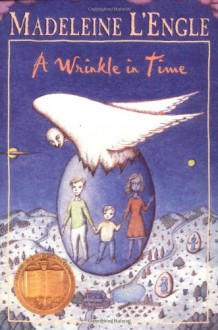
I decided to reread A Wrinkle in Time again because I am also going to reread the remainder of the Murry/O'Keefe series and I am one of those people who needs to begin at the beginning. I don't have anything to add to this review, except that I remain in awe of Madeleine L'Engle's extraordinary humanity. She was a remarkable woman, and I'm not sure that we deserved her.
Rereading the book inspired me to rewatch the movie, as well. Maybe this weekend!
Review from 3/24/18:
I decided to reread after seeing the new Ava DuVernay adaptation with my daughter. I read the book as a child of the 1970's - probably a bit more than decade or so after the initial 1963 publication, around 1977, when I was 11. I fell in love with the book then, seeing much of myself in Meg Murry, the ordinary, often grumpy, young woman. I revisited L'Engle in 2015, and found that, while some of her books had not held up with reread, many of them did.
This book is part of my personal canon, one of the books that shaped my childhood and had a part in making me who I am today.
A Wrinkle in Time is a bit of a period piece, to be sure. Girls today are stronger, more self-aware, more cognizant of the pressures of an often sexist society, and more willing to buck convention in order to be authentic to themselves. Not all girls, of course, but some girls. Our culture, today, at least struggles to understand these pressures and to acknowledge that they exist, even if we often fail to genuinely confront them.
The DuVernay adaptation succeeds in a way that, after reading alot of L'Engle, and a fair amount about L'Engle, I believe that she would appreciate. Casting Meg Murry as a biracial young woman was an inspired decision, the relocation of the plot to a more diverse location in California, the addition of Charles Wallace as an adopted child, to me really work to illuminate some of the themes that L'Engle was writing about - alienation and dangers of extreme social conformity in particular.
There are parts of the book that are quite different from the movie, of course. In the book, the Murry's have two additional children, a set of male twins who are effortlessly socially competent. They are capable of fulfilling society's expectations with little work. Meg, on the other hand, is prickly, defensive, occasionally angry, and fearsomely intelligent - all things which 1963 America couldn't really cope with in girls. Heck, we still struggle with girls who are prickly, defensive, occasionally angry and fearsomely intelligent.
A Wrinkle in Time shines light into dark places. For that alone, it's worth reading.

 Log in with Facebook
Log in with Facebook 








